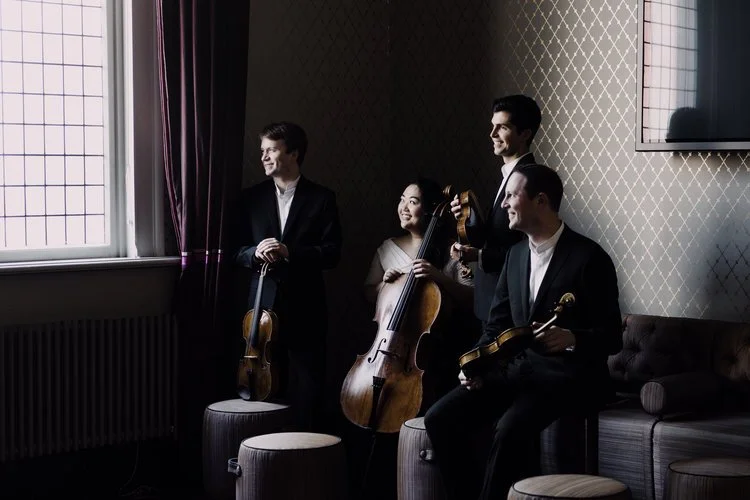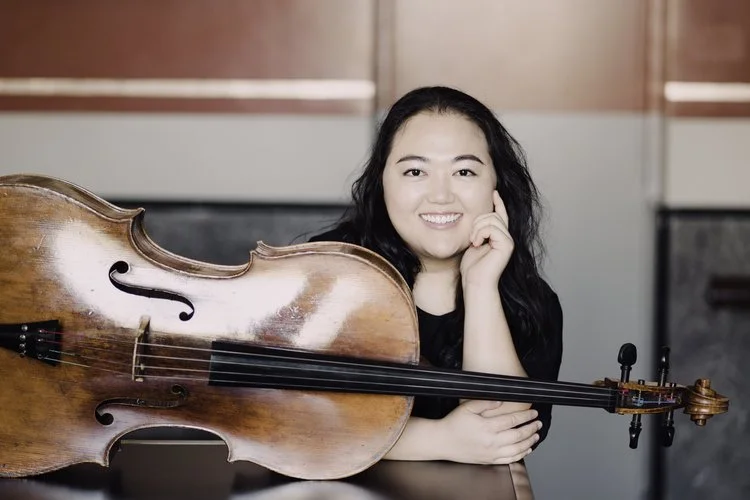The Calidore String Quartet brings a unique balance to Vancouver from New York City
The ensemble’s four members have different ideas about what to focus on in rehearsal—and that works to their advantage
The Calidore String Quartet
Friends of Chamber Music presents the Calidore String Quartet on November 1 at 7:30pm at the Vancouver Playhouse
A GLANCE AT the list of venues that the Calidore String Quartet has performed in since its inception in 2010 is wow-inducing: Carnegie Hall, Wigmore Hall, the Kennedy Center, Konzerthaus Berlin, Brussels’s BOZAR, Cologne Philharmonie, and Seoul’s Kumho Art Hall, to name a few. Reviews bring up phrases like “deep reserves of virtuosity” and “irrepressible dramatic instinct”. Then there’s a description of the ensemble that reads: “four more individual musicians are unimaginable, yet these speak, breathe, think and feel as one” (from the Washington Post). The mention that each one of the artists is distinct from the next is perfectly apt, says Calidore cellist Estelle Choi. And she notes that this apparent incongruity is one of the group’s greatest strengths.
Speaking to Stir on the line from New York City, where the Los Angeles-born quartet is now based, Choi says that the differences between her and the ensemble's other members became strikingly obvious following a recent series of musical-coaching sessions. The coach sat the musicians down and asked each one to point out what the other members would be most likely to mention during rehearsal.
“We often have our own pet peeve,” Choi says. “Maybe one of us is obsessed about sound quality or tone or balance, and another one is obsessed with rhythm. One could be obsessed with interpterion or phrasing. We each explained who does this or who talks about that.
“What he pointed out to us was: ‘Even though you all talk about something different, you all complement each other,’” she recalls. “‘You know that somebody is taking care of that aspect of your music-making.’ It is a nice way of thinking of things. With the chamber music we play, we all have our roles. We’re all contributing in our own special way, and that’s how you create harmony and balance within the group. We have very different personalities, but we balance each other out. And luckily we all have a similar sense of humour.”
The Calidore String Quartet will soon bring its inherent polyphony to Vancouver. The group's upcoming concert marks the first time Friends of Chamber Music has worked with the ensemble, which earned international attention upon winning the $100,000 Grand Prize of the 2016 M-Prize International Chamber Music Competition. The ensemble went on to receive a 2018 Avery Fisher Career Grant and a 2017 Lincoln Center Emerging Artist Award. The Calidore String Quartet was the first and only North American ensemble to win the Borletti-Buitoni Trust Fellowship. Today, the ensemble is recognized as one of the leading interpreters of a diverse repertory that ranges from classics by the likes of Beethoven and Mendelssohn to contemporary pieces by composers such as Grygory Kurtag and Caroline Shaw.
The artists headed for the Big Apple eight years ago, seeking a change from their West Coast roots. The move opened the doors to a residency at Stonybrook University, a mentorship with the Emerson Quartet, and teaching opportunities at the University of Delaware School of Music, where they also serve as directors of the recently established Graduate String Quartet Residency. Choi admits that she had no idea what would become of her music-making after she left Calgary post-high school.
Choi connected with the other members of the quartet—Jeffrey Myers, Ryan Meehan, and Jeremy Berry—at L.A.’s Colburn School after studying in New Haven, Connecticut. While discovering her passion for performing and teaching, she felt that the stars aligned upon meeting her future ensemble mates. “It just felt really right in terms of chemistry, even just the friendships that were formed,” Choi says. “Professionally, the work ethic somehow gelled. I was going into it with the least amount of string quartet experience [of the group] than the others, and I learned a tremendous amount from them. We have grown and evolved together. We’re like a mini family that travels together and often spends many days in a row together. We’re very, very lucky.”
Estelle Choi.
Over the years, the quartet has not only played on many of the world’s greatest stages but has also appeared at renowned festivals such as the BBC Proms, Mostly Mozart, and Music@Menlo. “There’s this energy, this rush that I get being on stage and sharing pieces or a whole program with the audience,” Choi says. “There’s this element of unpredictability and fleetingness. Every day, every performance is different. We can rehearse and practise as much as we can and try to plan out what could happen, but that spontaneity always draws me back to the stage.
“And I so appreciate being able to share these performances with three other people who are so dear to me and who are so close,” she adds. “We all know each other so well, and to get to go out on stage day after day and hang out with your friends and make wonderful music… I love that.”
The tight-knit group is also nearing completion of its most ambitious recording project to date, taking on the complete cycle of Beethoven’s String Quartets for Signum Records. The recording will involve multiple releases beginning in March 2023.
Vancouver audiences will get an idea of what that recording will sound like, with one of the pieces on the program being the legendary composer’s String Quartet No.6 in B-flat Major, Opus 18, No.6. It’s the last of six quartets of Beethoven’s early period. “You get the classical elements he’s bringing back from the Father of String Quartet, Haydn, and then from Mozart,” Choi says. “But you also sense how he is verging towards his middle period and becoming even more adventurous with the nature of the roles of the instruments. You see this independence, even in the cello part, which begins to emerge…and gains equal footing with the other instruments. It’s fun to explore that.”
Also on the program are selections from At the Octoroon Balls by legendary jazz artist Wynton Marsalis (listen for the train-like sounds in the last movement, “Hellbound Highball”, Choi says) and Bedřich Smetana’s String Quartet No. 1 in E minor “From my Life”. The latter was written at a point when the composer’s health was quite poor; he was losing his hearing and suffering from tinnitus. “He even brings into the music this high-pitched harmonic from the first violin that represents the ringing that had been happening in this ear,” Choi says. “It’s very nostalgic, with dancing rhythms from his youth; he remembers when he was able to be exuberant in his younger times. It’s a really beautiful work, and it highlights the viola.”
In addition to the sense of balance the Calidore String Quartet aims to share on stage, the musicians will also bring with them a certain energy from their adopted home city.
“To see New York City rebound after the worst of the pandemic, has been really inspiring,” Choi says. “It’s a very exciting time to be living here. There’s a resilience in the city that’s unlike anywhere else we’ve been. It’s now eight years in for us. We’re starting to feel like New Yorkers.”











